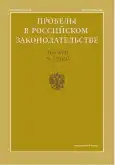Problems of International Law in the Sphere of Struggle with Terrorism
- Authors: Pankina N.A.1, Kravets I.P.1
-
Affiliations:
- Volga State University of Water Transport
- Issue: Vol 17, No 2 (2024)
- Pages: 140-151
- Section: International Legal Sciences
- URL: https://journals.eco-vector.com/2072-3164/article/view/631105
- EDN: https://elibrary.ru/NBCENG
- ID: 631105
Cite item
Abstract
The article examines the issues of international law in the field of combating terrorism, since the growing international significance of conflicts contributes to the expansion of the scope of application of a more acute, uncompromising and, at the same time, comparable means of struggle for the conflicting parties, which is terrorism. Moreover, terrorist actions, growing into the political configuration of the conflict, reflecting the goals, objectives, capabilities and tactics of the warring parties, transform terrorism into an international phenomenon classified as a global threat. This, firstly, draws attention to the conflict, giving it an international dimension. But what is perhaps more important, and this is secondly, is that terrorism is acquiring signs of a substance of international life, which, in its dangerous mobility, largely determines the state of the international social environment. The purpose of the presented research is to consider issues arising in this area regarding the construction of terrorism as a conflict-generating and influential international actor, confirming that in the fight against it, international law should cover with its influence all the components that form this construction, concentrating priority efforts on its most destructive elements. Based on the study, the author comes to the conclusion that stability in international relations will increase, if not undermine, but, on the contrary, strengthen the potential of the state. This is obvious, firstly, because there is simply no alternative to the state that even approaches the level of authority. And secondly, the state’s capabilities in the field of foreign and domestic policy objectively remain unique. Even opponents of the state-centrist model are forced to admit this, in part. It is precisely based on these opportunities, primarily in international organizations, that it is advisable to begin to create an international anti-terrorist system, the quintessence of which should be updated international law regulating the entire complex of social relations in any way related to the fight against terrorism.
Keywords
Full Text
About the authors
Nadezhda A. Pankina
Volga State University of Water Transport
Author for correspondence.
Email: kipkn@mail.ru
SPIN-code: 3378-0760
Scopus Author ID: 1186876
Lecturer at the Department of Theory and History of State and Law, Institute of Economics, Management and Law, Department of Theory and History of State and Law
Russian Federation, Nizhniy NovgorodIvan P. Kravets
Volga State University of Water Transport
Email: kipkn@mail.ru
SPIN-code: 7211-3157
Scopus Author ID: 824982
Cand.Sci.(Law), Head of the Department of State and Legal Disciplines, Institute of Economics, Management and Law, Department of State and Legal Disciplines
Russian Federation, Nizhniy NovgorodReferences
- Bigo D. Security problems: theoretical discussions and institutional context / International relations: sociological approaches / Director. auto count prof. P.A. Tsygankov. – M.: Gardarika, 1998. – P.266, 269,270, 302-304.
- Bratimov O.V., Gorsky Yu.M., Delyagin M.G., Kovalenko A.D. The practice of globalization: games and rules of the new era. – M.: INF RA – M, 2000. – P.229-232.
- Groom John. The growing diversity of international actors // International relations, sociological approaches / Director. auto coll. prof. P.A. Tsygankov. - M.: Gardarika, 1998. - P. 239.
- James Brown Scott. The Spanish Origin of International Law: Francisco de Vitoria and His Law of Nations. London: Humphrey Milford, 1934.
- Karakulyan. E.A. The idea of the international community in the history of international legal doctrines (theoretical and legal analysis) // State and Law. Bulletin of Nizhny Novgorod University named after. N.I. Lobachevsky. – 2013. – No. 3 (2). – pp. 74-79.
- Kravets I.P. Organizational and legal mechanism for investigating terrorist acts committed through explosions: Dis. ...cand. legal Sci. M. – 2010. EDN:QEZYKF.
- Minkovsky, G.M. Characteristics of terrorism and some directions for increasing the effectiveness of the fight against it / G.M. Minkovsky, V.P. Revin // State and Law, 1997. – No. 8. – P. 84.
- Panarin A.S. The temptation of globalism. Series “Russia and the World: Results of the 20th Century”, almanac. No. 1/2000. M.: Russian National Fund. 2000. – P.14,15, 58-60.
- Trainin, A.N. Selected works. Protection of peace and criminal law / A.N. Trainin. – M., 1969. – P. 55-56.
- Utkin A.I. American strategy for the XXI century. Publisher: M.: Logos, 2000.
- Ferguson J. Global society at the end of the twentieth century / International relations: sociological approaches / Director. auto count prof. P.A. Tsygankov. – M.: Gardarika, 1998. – P.203.
- Himes J.S. Conflict and Conflict Management. Athens, 1980.
- Huntington S. Clash of Civilizations / Trans. from English T. Velimeeva. Yu. Novikova. - M.: AST Publishing House LLC, 2003. – P. 302.
- Tsygankov P.A. Global political trends and sociology of international relations // International relations, sociological approaches / Director. auto coll. prof. P.A. Tsygankov. – M.: Gardarika, 1998. – P.45.
- Chossudovsky: NATO Occupation of Macedonia. Nicolai von Kreitor on August 16, 2001 g.
Supplementary files








